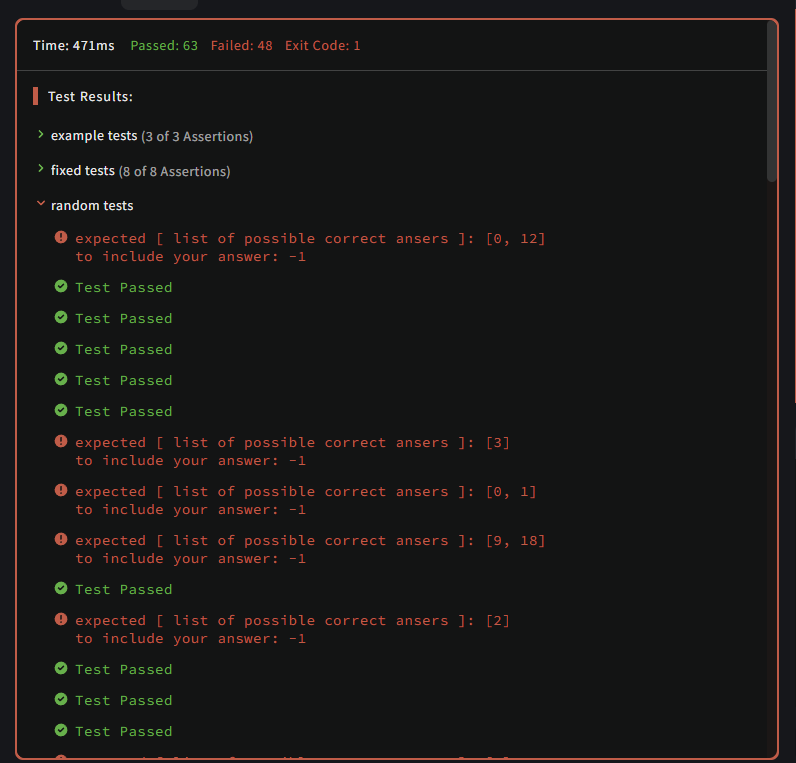hogwarts
2022 年5 月 9 日 02:26
1
【示例】
题目难度:简单CodeWars-Least Larger
def solution(nums: list, idx: int)-> int:
# your code here
assert solution([4, 1, 3, 5, 6], 0) == 3
assert solution([4, 1, 3, 5, 6], 4) == -1
assert solution([1, 3, 5, 2, 4], 0) == 3
def solution(nums:list,idx:int)-> int:
big_nums = [nums[i] for i in range(len(nums)) if nums[i]>nums[idx]]
if len(big_nums)>0:
return nums.index(min(big_nums))
else:
return -1
if __name__ == '__main__':
print(solution([4, 1, 3, 5, 6], 0))
print(solution([4, 1, 3, 5, 6], 4))
print(solution([1, 3, 5, 2, 4], 0))
print(solution([1, 3, 5, 7], 0))
llbai
2022 年5 月 9 日 03:36
4
“找出刚好比给定索引对应的数字值大一点的数字"中“大一点”有歧义
llbai
2022 年5 月 9 日 03:43
5
只找nums[idx]+1的数字会有点问题
joyoko
2022 年5 月 9 日 03:44
6
有点没搞定为嘛Kata 随机测试跑不过,回头我再看看。
def solution(nums: list, idx: int)-> int:
# your code here
if (n := nums[idx] + 1) in nums:
return nums.index(n)
else:
return -1
joyoko
2022 年5 月 9 日 03:45
7
hogwarts:
大一点
嗦嘎 感谢学委大大的提醒 感情这不是真的就大一点。
def solution(nums: list, idx: int) -> int:
li = []
for i in nums:
if i > nums[idx]:
li.append(i)
if len(li) == 0:
return -1
else:
return nums.index(min(li))
assert solution([4, 1, 3, 5, 6], 0) == 3
assert solution([4, 1, 3, 5, 6], 4) == -1
assert solution([1, 3, 5, 2, 4], 0) == 3
def solution(nums: list, idx: int) -> int:
ls2 = [i for i in nums if i > nums[idx]]
if len(ls2) > 0:
return nums.index(min(ls2))
else:
return -1
if __name__ == '__main__':
assert solution([4, 1, 3, 5, 6], 0) == 3
assert solution([4, 1, 3, 5, 6], 4) == -1
assert solution([1, 3, 5, 2, 4], 0) == 3
def solution(nums: list, idx: int)-> int:
# your code here
return -1 if sorted(nums[:]).index(nums[idx]) == len(sorted(nums[:])) - 1 \
else nums.index(sorted(nums[:])[sorted(nums[:]).index(nums[idx]) + 1])
assert solution([4, 1, 3, 5, 6], 0) == 3
assert solution([4, 1, 3, 5, 6], 4) == -1
assert solution([1, 3, 5, 2, 4], 0) == 3
# 由于题目及示例表述问题,此处按照返回索引处理
def solution(nums: list, idx: int)-> int:
# your code here
return nums.index(sorted(nums)[sorted(nums).index(nums[idx])+1]) if sorted(nums).index(nums[idx])+1 < len(nums) else -1
assert solution([4, 1, 3, 5, 6], 0) == 3
assert solution([4, 1, 3, 5, 6], 4) == -1
assert solution([1, 3, 5, 2, 4], 0) == 3
joyoko
2022 年5 月 9 日 04:47
14
修改后的代码。
def solution(nums: list, idx: int)-> int:
# your code here
if len(n := list(filter(lambda x: x > nums[idx], nums))) > 0:
return nums.index(min(n))
else:
return -1
def solution(nums: list, idx: int) -> int:
nums_bak = [i for i in nums]
nums.sort()
data = nums_bak[idx]
if data == max(nums):
return -1
else:
i = nums.index(data)
result = nums[i+1]
return nums_bak.index(result)
assert solution([4, 1, 3, 5, 6], 0) == 3
assert solution([4, 1, 3, 5, 6], 4) == -1
assert solution([1, 3, 5, 2, 4], 0) == 3
题目描述有问题,按照检验,返回的应该是返回值对应的索引值
def solution(nums: list, idx: int)-> int:
data = nums[idx]
if max(nums)==data:
return -1
return nums.index(min([num for num in nums if num > data]))
assert solution([4, 1, 3, 5, 6], 0) == 3
assert solution([4, 1, 3, 5, 6], 4) == -1
assert solution([1, 3, 5, 2, 4], 0) == 3
def solution(nums: list, idx: int)-> int:
target = nums[idx]
litter_big = None
litter_big_index = -1
for index,value in enumerate(nums):
if value>target and (litter_big is None or value < litter_big):
litter_big = value
litter_big_index = index
return litter_big_index
HLK
2022 年6 月 1 日 03:18
20
def solution(nums: list, idx: int)-> int:
num = nums[idx]
num_diff = [(nums[i],nums[i]-num) for i in range(len(nums)) if nums[i]-num>0]
num_diff.sort(key=lambda x: x[1])
return [nums.index(num_diff[0][0]) if len(num_diff) != 0 else -1][0]
assert solution([4, 1, 3, 5, 6], 0) == 3
assert solution([4, 1, 3, 5, 6], 4) == -1
assert solution([1, 3, 5, 2, 4], 0) == 3
![]() 给定一个数字列表(无重复)和一个索引值,请编写一个函数,找出刚好比给定索引对应的数字值大一丢丢的数字。 如果存在则返回该数字,如果不存在则返回-1。
给定一个数字列表(无重复)和一个索引值,请编写一个函数,找出刚好比给定索引对应的数字值大一丢丢的数字。 如果存在则返回该数字,如果不存在则返回-1。

